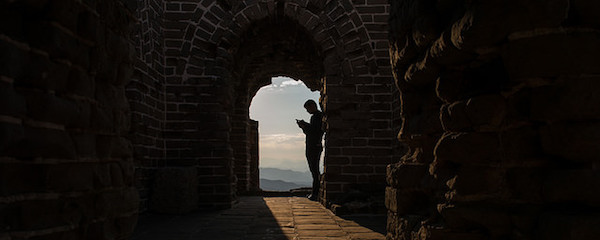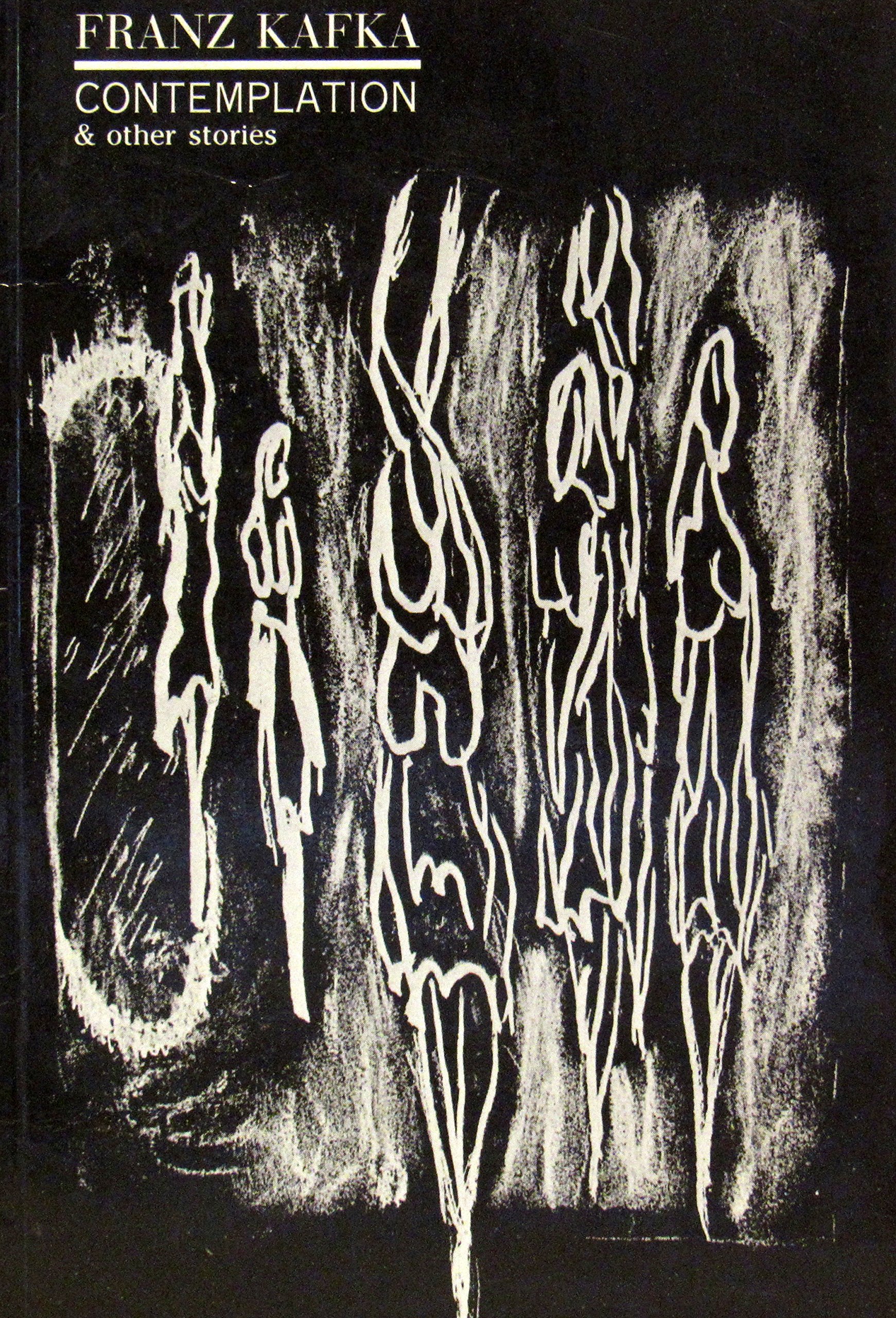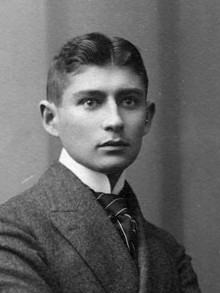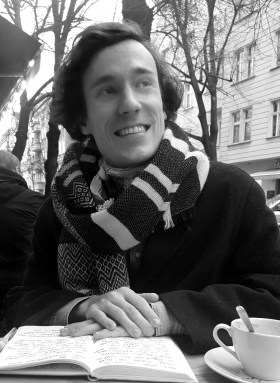
('Great Wall at Simatai' © Jens Schott Knudsen, 2014)
*
LIFE AS A PARABLE: FRANZ KAFKA’S ‘THE GREAT WALL OF CHINA’
by ANTON DECHAND
*
For we are like tree trunks in the snow. In appearance they lie sleekly and a little push should be enough to set them rolling. No, it can’t be done, for they are firmly wedded to the ground. But see, even that is only appearance.
~ Franz Kafka: ‘Trees’
I never mention his name among my favourite authors. Yet there are few writers that have been with me for so long and never ceased to be a source of amazement. I know I can always come back to Franz Kafka and it gives me a strange comfort to do so. He’s like a talisman from a foreign culture: riddled, inconceivable, yet commonplace and imbued with a personal history.
I started dabbling in Kafka in high school, but I did not fully enter his world before university. If you study German literature, like me, there is no escaping the man. Time and again, I found myself in seminars, dissecting parts of Gregor Samsa’s transformed body, inspecting the torture instrument of ‘In the Penal Colony’, analysing his brief parables, and looking for repressed content in the ‘Letter to his Father’. Shelves upon shelves burst with publications on every puny motif in Kafka’s writings – one feels everything has already been said. Kafka and Existentialism, Kafka and the big city, Kafka and animals, Kafka and death, Kafka and you. Every major school of interpretation has had its try and failed at understanding Kafka, which is why he never gets boring. It’s ultimately up to you, the reader, what you make of it.
It was his first short story collection, Contemplation, that made me a believer. The small booklet is essentially flash fiction, prose pieces that were four pages at most. Elliptic and solipsistic, these pieces feature observations and monologues by unnamed narrators, all of whom are either forsaken or confused, or both. I felt forsaken, and confused, too, tucked away in a random German town, and I gobbled up these pages. They spoke to me in some urgent way and I tried copying the style, to no avail. The stories were bold and experimental, even if slightly pretentious (that, I didn’t notice). They hinted at prominent Kafka themes, such as shame and guilt, the paradoxes of existence, and the futility of endeavours. Way before ‘The Judgement’, Kafka announced himself as a master of tone, mood and expression; some parts of Contemplation are almost prose poems.
Throughout the years, I kept reading and re-reading Kafka, with a preference towards the lesser-known and obscure. One of my favourites until this day is ‘The Great Wall of China’. Even if John Updike asserts, in the introduction to The Complete Stories, that ‘The Great Wall of China’ belongs to the ‘summit of Kafka’s oeuvre’, it never seems to get enough attention, nor was it among the works he deemed worthy of printing. Kafka penned it in his middle phase, in 1917; it was published posthumously in 1931 and remains a fragment.
oeuvre’, it never seems to get enough attention, nor was it among the works he deemed worthy of printing. Kafka penned it in his middle phase, in 1917; it was published posthumously in 1931 and remains a fragment.
The English title – chosen by Willa and Edwin Muir – is misleading, and ironic. Originally, the story was called ‘Beim Bau der Chinesischen Mauer’, which literally translates to ‘During the Construction of the Great Wall of China’. This goes to say, it is not about the wall but the construction. The text concerns itself with a certain transient moment in time, a work in progress, which makes sense since the promised wall remains questionable. Besides, the wall is not the heart of the matter.
‘The Great Wall of China’ is told by an unnamed narrator from a southeast Chinese province ‘almost on the borders of the Tibetan Highlands’. He speaks as a chronicler, commenting on the erection and the purposes behind the Great Wall. The second half of the story abandons this topic and finds him musing on the institution of the empire and the status of the Emperor. I have encountered two versions of an ending. Number one (in my German collection) ends abruptly while the narrator remembers the first time his father had heard about the plans to construct a wall. Number two ends one paragraph prior, just as the narrator finishes laying out the conflicted beliefs of his people.
Over and over again it must be repeated: There is perhaps no people more faithful to the Emperor than ours in the south, but the Emperor derives no advantage from our fidelity.
Now there are some inconsistencies with our wall. It was built as a ‘piecemeal construction’ and may or may not feature huge gaps. The narrator goes to great lengths to expound the unorthodox way that it was built, not as a continuous structure, but as free-standing walls here and there. On one hand, it served to pacify the construction supervisors who were given a sense of accomplishment with each finished block. Then again, it was a deliberate decision by the high command, albeit ‘makeshift and therefore inexpedient’. Seemingly, there were other reasons.
We read that the fabulous wall is being erected to deal with the dangerous Nomads from the North. But the Nomads travel extensively and have a better overview of the wall’s progress: they will always be one step ahead. At the same time, the Nomads could never bother anyone in the South:
We have not seen them, and if we remain in our villages we shall never see them, even if on their wild horses they should ride as hard as they can straight toward us – the land is too vast and would not let them reach us, they would end their course in empty air.
Enter the realm of the legend. In fact, our narrator admits he thinks ‘that the high command has existed from all eternity, and the decision to build the wall likewise’. But what the high command is exactly stays nebulous, just as the identity of the Emperor does – unseen, guarded far off in his palace in Peking, which might as well be on the moon. In fact, people in our narrator’s village ‘do not know what Emperor is reigning, and there exist doubts regarding even the name of the dynasty’. Past and present mingle, causality is non-existent. How can history be written when nothing is certain?
A central part of the story is a parable. Published separately as ‘A Message from the Emperor’, it holds the key to the confusion. The dying Emperor wants a special message delivered to ‘you, the humble subject’ and entrusts a willing and able messenger. However, this messenger must necessarily fail because of the infinite nature of his obstacles:
[…] still, he is only making his way through the chambers of the innermost palace; never will he get to the end of them; and if he succeeded in that nothing would be gained; the courts would still have to be crossed; and after the courts the second outer palace; and once more stairs and courts; and once more another palace; and so on for thousands of years; and if at last he should burst through the outermost gate – but never, never can that happen – the imperial capital would lie before him […] Nobody could fight his way through here even with a message from a dead man.
My point is: we’ve been tricked, willingly. Making sense of a story by Kafka is a doomed endeavour, like waiting on said royal message. After all, the narrator is an outsider and no trustworthy authority. What we’re given is an alternate history, carefully wrapped in philosophic argumentation. It’s a testament to the narrator’s gift of gab that he is able to sell us his version as the ultimate truth, then question any truth per se and hide behind a veil of beautiful metaphors. He uses phrases such as ‘naturally’, ‘obviously’, ‘an incorruptible observer’, ‘it was widely believed’ to create an illusion of authority. We smile and recognise a characteristic of Kafka’s prose, sometimes dubbed ‘Beamtensprache’ in German – meaning official language, very precise and vague.
 But, read on! The Emperor-parable ends on a positive note: ‘But you sit at your window when evening falls and dream it to yourself.’ The message is in your own hands; it is not hidden and inconceivable.
But, read on! The Emperor-parable ends on a positive note: ‘But you sit at your window when evening falls and dream it to yourself.’ The message is in your own hands; it is not hidden and inconceivable.
‘The Great Wall of China’ could be a complex story of self-reference (building a house or a wall is building a text). It could be criticism of knowledge and history. It could be about the power of the human spirit reaching out beyond despite its obvious limitations. However one may interpret it, this story sets itself apart from well-known works like ‘The Castle’ or ‘In the Penal Colony’ by its light tone of nostalgia and reconciliation. The setting sun of the Emperor reflects off these pages, coupled with the narrator’s love for his people that he sides with. It’s also an inherently hopeful tale. We humans pour ourselves into acts we may not fully understand, and by doing this we give our lives a meaning. Whether we fail is beside the point.
Finally, this story is a testament to the power of storytelling itself. As human beings we have the need for stories: they heal us, they explain the world to us, and they bring us closer to ourselves. Some stories showcase dynamics of human relationships; others reveal a whole character in a throwaway adjective. When one first approaches Kafka – and peels away layers of preconception from precocious eyes – fascination can meet irritation. The stories seem so convoluted, so devilishly smart, so devoid of (positive) sentiment. Flawed mavericks battle inhumane bureaucracies, suffer setbacks, are ridiculed, tortured, die. There is none of that in our Chinese tale. Absurdity exists, yes, but we’re not plagued by it. We laugh.
Franz Kafka is essentially a humorous writer. His take on absurdity has not the acrid taste of Beckett or Camus but the tongue-in-cheek quality of Ionesco. In Kafka the ridiculous and absurd is wedged into everyday life, which takes away some of its edge. It’s pronounced with the calm voice that only adds to its humorous potential, just look at Gregor Samsa, in ‘The Metamorphosis’, waking up as a vermin and pondering trivialities of his workday. In ‘The Great Wall of China’, when the narrator mentions that his townsfolk worships dead Emperors and fail to take visiting government officials seriously, the humorous effect arises precisely because the chronicler is so unmoved by this fact. Yes, he admits, it is peculiar but his people have the utmost loyalty. Who can doubt that?
It’s no coincidence Kafka chose the Chinese setting. Moving towards the ultra-brief forms of aphorisms, parables and myths in his late work he studied the Chinese classics extensively, amongst others Confucius and Lao-Tzu. In Walter Strauss’ On the Threshold of a New Kabbalah: Kafka’s Later Tales, we read that Kafka bravely admitted his own limitations:
I am fascinated by them, but their kernel remains hidden from me. I’ve re-read them several times. I discovered that – like a little boy playing with glass marbles – I followed them from one cranny of thought to another without in any way getting any further.
As a modernist, Kafka was right at the heart of things with his scepticism of knowledge. I think his insights are still crucial today, in the age of post-truth where world leaders bend facts to their own liking, and plan to erect walls between countries. Sometimes I wonder: what would Kafka think of the information surplus? Would he be critical of the internet and instant messaging; would he find his own fears materialised? After all, that’s how the internet works, an ever-present structure, ever-refreshing, ever-updating, retouching and moulding reality. On the interwebs, the individual fades and gives way to the power of anonymity.
In many ways, this has been Kafka’s century, and he is arguably among the best short story writers in German language. And now that I’m forgetting all the lofty theories I learned in college, I can take a fresh look at him. I see an intensely creative man deftly moving in his own universe of speaking apes, singing mice, and cat-lambs. They sit in peace upon a wide meadow. Sun is setting. He’s winking at me.
~
 Anton Dechand was born in Russia and currently resides in self-proclaimed “poor, but sexy” Berlin, Germany. Whenever not working on short stories or essays, he shares opinions about movies on Berlin Film Journal. Meanwhile, his alter ego Alissa Salzman pens letters from Moscow to Jerusalem in a collaborative German-Spanish project on fixpoetry.com. He holds an MA in Comparative Literature from the Free University in Berlin and feels strongly for languages – especially those in non-Latin script – and the United States of America.
Anton Dechand was born in Russia and currently resides in self-proclaimed “poor, but sexy” Berlin, Germany. Whenever not working on short stories or essays, he shares opinions about movies on Berlin Film Journal. Meanwhile, his alter ego Alissa Salzman pens letters from Moscow to Jerusalem in a collaborative German-Spanish project on fixpoetry.com. He holds an MA in Comparative Literature from the Free University in Berlin and feels strongly for languages – especially those in non-Latin script – and the United States of America.

